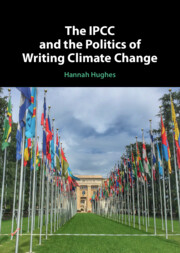Acknowledgements
I didn’t write this book alone.
The book developed from a United Kingdom Economic and Social Research Council (ESRC) PhD studentship (ES/H010394/1) and the generous supervision I received during four years at the International Politics Department at Aberystwyth University from Andrew Linklater, Mike Williams, Richard Jackson and Kamila Stullerova. It benefited from further research through the ESRC project “The Politics of Science in International Climate Cooperation” (ES/W001373/1). The Open Access version was enabled by a United Kingdom Research Innovation (UKRI) award.
To have Andrew Linklater as a supervisor was to experience something new – to be able to talk about how I saw and understood the world without interruption. He was the most incredible listener. He asked a question and stayed completely still, listening while I responded. I often measure my own supervision abilities and the air space I take next to his, and I still have the art of listening to learn. To be allowed to speak in that way gave me confidence in my ability and I needed that. Mike only supervised me for a short time while I was at Aberystwyth and then as a visiting scholar in Ottawa. However, he saw that I needed books in a way I didn’t know myself. He would casually suggest that I go and read a book relevant to what I was puzzling, which would inspire me to think a bit harder. In this respect, I must also thank one of the book reviewers. They suggested several titles to help me bridge from where I was to where I needed to get in terms of the analytical contribution that I was trying to make. Those books were immensely helpful in refining order as the real matter of things.
Turning the PhD into a book has been a long process, and there are people that I want to thank for their generous time and support. Mat Paterson has been an incredible mentor, and I am very grateful for all his support, from quick email checks to attending a book workshop that was kindly supported by the School of Law and Politics at Cardiff University. You are wonderful Mat and Jo, thank you. I am grateful for the feedback from Steven Bernstein at the workshop, for his support of all my project ideas and for his company just hanging out, wandering around and eating stuff. Matthew Eagleton-Pierce, Inanna Hamati-Ataya and Alexander Ruser attended the workshop along with colleagues at Cardiff (Ben Pontin and Dot Kwek), and I am grateful for each question and comment that helped me to consider how I was situating the book, putting things together and why. The book reviewers were also excellent in this regard; I had six sets of mostly supportive comments that gave me practical advice for focusing the book and editing its content.
I want to thank my colleagues in the International Politics Department at Aberystwyth University for their support, including funding a research assistant, Lewis Birley, to help prepare the final manuscript. I really began to struggle to immerse myself in re-writing and keeping on top of everything else, missing meetings, forgetting things I’d promised and even turning up an hour late for a lecture. My colleagues quietly sorted out my muddles and gave me space to repair and carry on. Thank you.
I could not have undertaken this project if participants to the IPCC had not generously given their precious time for interviews, follow-up email and discussions. The authors and bureau members I spoke to had already committed incredible effort to the IPCC, and their support of the project made me look again and think a bit deeper at any simple conclusions I might be tempted to reach. It is easy to become disheartened when your work is rejected and ignored. The fact that you answered my emails, kept your doors open and allowed me access kept me going through the many years of learning and revising and meant that this book had to be finished to repay the debt.
I try to stay conscious of the origins of my thinking and reference those that have informed this. Many scholars have inspired how I think and write in this book, but in the end, this may not be reflected in the final text. In the layered process of writing and updating, editing and rewriting, which has been the practice of writing my PhD into a book, much of the nitty-gritty of learning Bourdieu, his concepts and how others applied him has been lost so that I could hone in on my own understanding and the development of an analytical framework developed for and adapted to a study of the IPCC. There is also the reading and learning since the PhD, the scholars and books that have come to shape the changing nature of my understanding but weren’t directly related to this study and as a result may not be captured in the references and citations contained within this book. I apologise for any oversight you as a reader may observe.
The bulk of the PhD was written up in a little house on the corner with José Carli and finalised in a new home, overlooking the town as a family of four. I am sorry to all my family and friends for my absences over the years, when I’ve told you I can’t talk right now or haven’t messaged back and disappeared into getting this book into the next stage of its development. Thank you for still being there when I re-emerged. Finally, I want to thank Ron Rathbun. He reminded me that in the end, no one can tell me what I have come to understand. These words came back to me many, many times in the last months as I was tempted to send it out for just another pair of eyes and another final check. It is what it is now. Finished. I hope, somehow, my thoughts will contribute to a cleaner, fairer planet.
